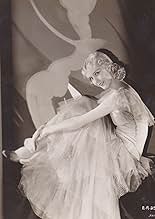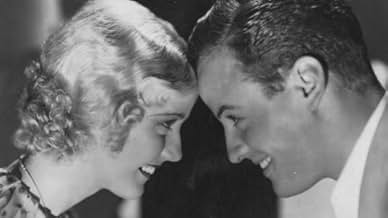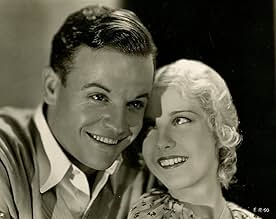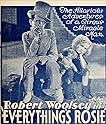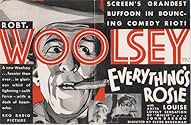A carnival huckster and his 17-year-old foster daughter try to be accepted by the townspeople when she and a handsome lad fall in love.A carnival huckster and his 17-year-old foster daughter try to be accepted by the townspeople when she and a handsome lad fall in love.A carnival huckster and his 17-year-old foster daughter try to be accepted by the townspeople when she and a handsome lad fall in love.
Alf James
- Al Oberdorf - Jeweler
- (as Alfred James)
Buster Brodie
- Little Bald Man at Auction
- (uncredited)
Nora Cecil
- Hotel Proprietress
- (uncredited)
George Chandler
- Jail Guard
- (uncredited)
Frank Darien
- Sam Hall
- (uncredited)
Charles Gillette
- Man
- (uncredited)
William Halligan
- Dr. Powers- Medicine Barker
- (uncredited)
Rochelle Hudson
- Lowe Party Guest by Punch Bowl
- (uncredited)
Arline Judge
- Guest at the Lowe party
- (uncredited)
Charles Meakin
- Lowe Party Guest
- (uncredited)
Featured reviews
It seems to me that this forgotten 1931 grade-B comedy starring Robert Woolsey who we lost too soon in some aspects may have inspired W C Fields' 1934 The Old Fashioned Way!
The review by kevinolzak for "Everything's Rosie" is a very good one as it points out correctly that this film is essentially a rip-off of a W.C. Fields play which was later brought to the screen as "Poppy". So, if you've seen "Poppy", you'll know what to expect in "Everything's Rosie". I am sure RKO claimed it was all a coincidence but the films clearly are nearly the same story.
When the story begins, Dr. Droop (Robert Woolsey) is a carny and spends much of his time separating folks from their money. However, there is a hidden decency about the man and so when he meets a tiny orphan, he takes her in and raises her as his own. The film soon skips ahead 15 years and this step-daughter is his assistant as they drift about the country going from carnival to carnival. This life is disrupted when she meets a nice guy and naturally she wants to settle down with him.
In so many ways, this film is similar to "Poppy" and while I think W.C. Fields was the best suited for the lead, Robert Woolsey was actually a very good substitute and was definitely in his element in the film. Anita Louise, who played his daughter, was fine...though VERY young when you consider that the film is about her possibly getting married....and she's only 15 in real life. Overall, it's a rather sweet story...well worth seeing....and it would make a great double-feature being shown along side the Fields film.
When the story begins, Dr. Droop (Robert Woolsey) is a carny and spends much of his time separating folks from their money. However, there is a hidden decency about the man and so when he meets a tiny orphan, he takes her in and raises her as his own. The film soon skips ahead 15 years and this step-daughter is his assistant as they drift about the country going from carnival to carnival. This life is disrupted when she meets a nice guy and naturally she wants to settle down with him.
In so many ways, this film is similar to "Poppy" and while I think W.C. Fields was the best suited for the lead, Robert Woolsey was actually a very good substitute and was definitely in his element in the film. Anita Louise, who played his daughter, was fine...though VERY young when you consider that the film is about her possibly getting married....and she's only 15 in real life. Overall, it's a rather sweet story...well worth seeing....and it would make a great double-feature being shown along side the Fields film.
EVERYTHING'S ROSIE (RKO Radio, 1931), directed by Clyde Bruckman, based on the story by Al Roasberg, stars the second half of the comedy team of Wheeler and Woolsey, that being Robert Woolsey, the glasses wearing, cigar smoking comedian of verbal wisecracks. As much as Bert Wheeler and Robert Woolsey never really achieved the popularity or lasting appeal as other comic duals of Laurel and Hardy or Abbott and Costello from the lack of television revivals in the sixties and seventies, it wasn't until cable television began resurrecting their products many years later did they earn some notable interest. With the revival of Wheeler and Woolsey movies comes the rediscovery of Woolsey in his only feature length comedy without Wheeler. The same occurred that year as Bert Wheeler starred without Woolsey in a little known comedy titled TOO MANY COOKS (1931). Though the attempt in separating the team came a bit early for them, following their 1929 screen debuts in the lavish-scale musical, RIO RITA (RKO), where Wheeler and Woolsey reprised their original Broadway roles, an attempt in offering the comedians the rare chance showing what they can do on their own, was only temporary. Though Wheeler seemed capable working as a solo comedian, what project could be used to showcase Woolsey's talents? An idea of pairing Woolsey with a talented duck in something called EVERYTHING'S DUCKY might have seemed possible. Instead, the writers developed what became known as EVERYTHING'S ROSIE by casting him opposite the youthful Anita Louise. Though Louise assumes the title role, the resulting film ends up being "Everything's Woolsey."
The story begins in 1916 where J. Dockweiner Droop, better known as "Doc," (Robert Woolsey with hair parted in the middle), living the life of an unlicensed carnival medicine man, selling wonder tonics (one that cures hoarseness) to a crowd full of suckers. Ordered to leave town by the county sheriff, "Doc" soon encounters a three-year-old ragamuffin being mistreated by an old hag on the street. Told the little girl happens to be an orphan she found a year ago and would like nothing more than to pass her off to someone else, it turns out the child, Rosie, takes an immediate liking towards the wiseacre, and follows him. Before he knows it, "Doc" unwittingly becomes her foster father. Fourteen years later, "Doc," still a carnival medicine man, continues to devote himself towards Rosie (Anita Louise), now 17. Over the years, "Doc" and Rosie have lived from carnival to carnival, always one step ahead of the sheriff. For Rosie, she's acquired Doc's strategy by learning the tricks of the trade. While in a small town, Rosie meets a young man named Billy (John Darrow), a law student and son of the prosperous Emma (Florence Roberts) and Mr. Lowe (Frank Beal). Though already in a relationship with Madeline Van Dorn (Lita Chevret), Billy leans his attention towards Rosie. At Billy's 21st birthday party with friends and family in attendance, "Doc," passing himself off as European nobility, becomes a center of attention with his eccentric manner. It is then learned to the dismay of the guests as well as Mrs. Lowe of Rosie not being Doc's real daughter. Problems arise when authorities place Doc under arrest for jewelry store robbery, and place the under-aged Rosie in an orphanage.
For anyone familiar with both stage and screen career of W.C. Fields would notice similarities between Woolsey's "Doc" and Field's surrogate father, Professor Eustace McGargle, from both the 1923 stage production of POPPY and 1925 silent screen adaptation retitled SALLY OF THE SAWDUST, and sound version of 1936's POPPY with Fields in all playing a medicine man who fathers and raises a foundling girl. As surrogate father roles tend to work best for comedians wanting to be more than just comics, Charlie Chaplin's THE VAGABOND (1916) and THE KID (1921), being prime examples, for EVERYTHING'S ROSIE, Woolsey did what he could with such material that could have worked better suited for either a Chaplin or Fields. Editing in certain parts of this 66 minute film are slightly choppy. The screenplay and central character background are under developed. For Rosie, it's obvious she never attended school, having carnival life her sole means of education. Woolsey, whose cigar prop and gift of gab for comedy delivery, could very well be Groucho Marx assuming the lead and attempt in breaking away from his Marx Brothers teaming. But Woolsey being Woolsey, no doubt didn't come off with critical and public acceptance as a solo performer and soon resumed his screen partnership with Wheeler in a series of comedies until his death in 1938.
Regardless of one brief moment of pathos between Woolsey and Louise with organ scoring reminiscent to an old silent movie melodrama, EVERYTHING'S ROSIE is light on sentiment and strong on amusements, best being Woolsey's fortune telling routine to various customers, along with numerous hit and miss one-liners ("A myth is a female moth") that only Woolsey can recite. Never distributed to home video or DVD, this quaint little film, formerly shown on American Movie Classics (prior to 1992), sparingly turns up on Turner Classic Movies. Although the title of EVERYTHING'S DUCKY was actually used for a 1961 Columbia comedy featuring Mickey Rooney, which reportedly didn't do very well, but as for Woolsey, everything's rosie. (**)
The story begins in 1916 where J. Dockweiner Droop, better known as "Doc," (Robert Woolsey with hair parted in the middle), living the life of an unlicensed carnival medicine man, selling wonder tonics (one that cures hoarseness) to a crowd full of suckers. Ordered to leave town by the county sheriff, "Doc" soon encounters a three-year-old ragamuffin being mistreated by an old hag on the street. Told the little girl happens to be an orphan she found a year ago and would like nothing more than to pass her off to someone else, it turns out the child, Rosie, takes an immediate liking towards the wiseacre, and follows him. Before he knows it, "Doc" unwittingly becomes her foster father. Fourteen years later, "Doc," still a carnival medicine man, continues to devote himself towards Rosie (Anita Louise), now 17. Over the years, "Doc" and Rosie have lived from carnival to carnival, always one step ahead of the sheriff. For Rosie, she's acquired Doc's strategy by learning the tricks of the trade. While in a small town, Rosie meets a young man named Billy (John Darrow), a law student and son of the prosperous Emma (Florence Roberts) and Mr. Lowe (Frank Beal). Though already in a relationship with Madeline Van Dorn (Lita Chevret), Billy leans his attention towards Rosie. At Billy's 21st birthday party with friends and family in attendance, "Doc," passing himself off as European nobility, becomes a center of attention with his eccentric manner. It is then learned to the dismay of the guests as well as Mrs. Lowe of Rosie not being Doc's real daughter. Problems arise when authorities place Doc under arrest for jewelry store robbery, and place the under-aged Rosie in an orphanage.
For anyone familiar with both stage and screen career of W.C. Fields would notice similarities between Woolsey's "Doc" and Field's surrogate father, Professor Eustace McGargle, from both the 1923 stage production of POPPY and 1925 silent screen adaptation retitled SALLY OF THE SAWDUST, and sound version of 1936's POPPY with Fields in all playing a medicine man who fathers and raises a foundling girl. As surrogate father roles tend to work best for comedians wanting to be more than just comics, Charlie Chaplin's THE VAGABOND (1916) and THE KID (1921), being prime examples, for EVERYTHING'S ROSIE, Woolsey did what he could with such material that could have worked better suited for either a Chaplin or Fields. Editing in certain parts of this 66 minute film are slightly choppy. The screenplay and central character background are under developed. For Rosie, it's obvious she never attended school, having carnival life her sole means of education. Woolsey, whose cigar prop and gift of gab for comedy delivery, could very well be Groucho Marx assuming the lead and attempt in breaking away from his Marx Brothers teaming. But Woolsey being Woolsey, no doubt didn't come off with critical and public acceptance as a solo performer and soon resumed his screen partnership with Wheeler in a series of comedies until his death in 1938.
Regardless of one brief moment of pathos between Woolsey and Louise with organ scoring reminiscent to an old silent movie melodrama, EVERYTHING'S ROSIE is light on sentiment and strong on amusements, best being Woolsey's fortune telling routine to various customers, along with numerous hit and miss one-liners ("A myth is a female moth") that only Woolsey can recite. Never distributed to home video or DVD, this quaint little film, formerly shown on American Movie Classics (prior to 1992), sparingly turns up on Turner Classic Movies. Although the title of EVERYTHING'S DUCKY was actually used for a 1961 Columbia comedy featuring Mickey Rooney, which reportedly didn't do very well, but as for Woolsey, everything's rosie. (**)
1931's "Everything's Rosie" was the result of RKO's attempt to split the team of Bert Wheeler and Robert Woolsey (after six successful comedies together), in the mistaken belief that the duo would bring in twice the revenue by working in separate films. Wheeler's picture, "Too Many Cooks" (issued AFTER Woolsey's by the way), had just been completed when Woolsey began shooting his own, a story that has been described as a ripoff of W. C. Fields's stage hit "Poppy," previously made as the silent "Sally of the Sawdust," but not remade until 1936 (interestingly, Woolsey was a co-star in the Broadway version). Director Clyde Bruckman became notorious for borrowing other people's material, having worked with the likes of Buster Keaton and Harold Lloyd. What has never been discussed is the fact that "Rosie" also looks forward to such W. C. Fields titles as "You Can't Cheat an Honest Man," where Fields hilariously takes on high society. Cast as J. Dockweiler Droop ('Doc' for short), Woolsey is a carnival huckster revealed to have a heart of gold, adopting a three year old girl named Rosie who attaches herself to him. Growing into lovely adulthood (Anita Louise, breathtaking at 16), Rosie wants to move on from their wandering lifestyle and marry a wealthy young man who falls for her after splashing the girl with mud. 'Doc' name drops uncles all over the world, and the socialites always eat it up, even falling for the old shell game. There's really no part for Bert Wheeler in this film, and Woolsey is quite funny in his asides with suckers, not in the same league as Fields, but able to hold his own. Among the familiar faces are Noah Young (Harold Lloyd), Leo Willis (Laurel and Hardy), Frank Darien (Charlie Chase), and three performers who later worked with W. C. Fields himself- Nora Cecil ("You're Telling Me," "The Old Fashioned Way"), George Chandler ("The Fatal Glass of Beer"), and 15 year old Rochelle Hudson, "Poppy" herself, in only her second feature film (among the party guests). The experiment having failed, RKO quickly reunited Wheeler and Woolsey, who went on to do an additional 14 more features for the studio, only ending with Woolsey's untimely death in 1938.
"Everything's Rosie" is Robert Woolsey's only (surviving) film without the presence of his comedy partner, Bert Wheeler. It is a respectable effort with Woolsey playing a carnival con-man and his adopted daughter trying to fit in with the high society of a small town. This film has many laughs, but the primary difference between this and the other Wheeler/Woolsey films is that it is not afraid to stick dramatic moments into the comedy as well as treating the characters played by Woolsey and Anita Louise as real people instead of slapstick/cartoon characters. I generally liked this movie (being a fan of Wheeler & Woolsey, I usually like all their movies). However, Woolsey's abrasive comic personality is sometimes hard to take for a long period of time, even in this 67 minute film. This film would have worked a lot better had he been able to vent his jokes onto a comic foil, a role which Wheeler usually would have played. The video I have this movie on was taped off of Turner Classic Movies several years ago and features clear sound and very clear picture quality.
Did you know
- TriviaRobert Woolsey's only starring feature without Bert Wheeler. They were a popular comedy team at the time and the studio tried to capitalize on that by splitting them up to star in their own films. Wheeler's solo film was Too Many Cooks (1931). With the disappointing results from both films, these would be their only solo efforts until Woolsey's passing in 1938.
- Crazy creditsWith Anita Louise, lovely sensation of "Millie".
Details
Box office
- Budget
- $140,000 (estimated)
- Runtime1 hour 7 minutes
- Color
Contribute to this page
Suggest an edit or add missing content


